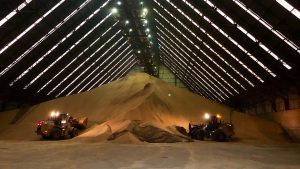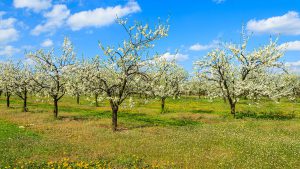GrainTALK for June/July 2019
GET THE LATEST NEWS FROM GRAIN FARMERS OF ONTARIO
| FROM THE CHAIR A Q&A with Grain Farmers of Ontario chair, Markus Haerle.  In continuation of last issue’s Ask The Chair, we focus on Trade, a federal election ask. Trade issues continue to impact our farm businesses in unpredictable ways, and we continue to urge our federal government to provide us stability in trade. We also need our government to commit to opening new markets for grain, especially in the face of trade uncertainties with some of our traditional trade partners. It is clear that the government bailout provided to U.S. farmers has put Canadian grain farmers at a disadvantage. Unlike supply-managed sectors, we do not have a trade risk fund. Ontario grain farmers need help to weather the storms caused by global governments and their inability to settle disputes. We also require a trade risk fund to protect us from new competition domestically if U.S. soybeans flood our market. CUSMA needs to be ratified to help re-establish the positive and important trade flow Canada, the U.S., and Mexico have had for years. Ask your local MP and federal candidates about their position on trade, trade dispute resolution, and their commitment to setting up a trade fund so that Ontario grain farmers are no longer at a disadvantage globally and domestically. I will cover our carbon tax ask in the next issue of Ontario Grain Farmer in Ask the Chair. • Do you have a question for our chair? Email GrainTALK@gfo.ca. |
SCN COALITION AWARDED
The SCN Coalition won the 2019 National Agri-Marketing Association (NAMA) Award for Overall Public Relations Campaign supporting a product, service, or corporate image. NAMA is the largest U.S. association for marketing and agribusiness, and the Best of NAMA Awards honour the nation’s best work in agricultural communications. The SCN Coalition is a public/checkoff/private partnership formed in 2018 to increase the number of growers who are actively managing soybean cyst nematode (SCN).
Grain Farmers of Ontario is a supporter of the SCN coalition and provides funding to support the work of Albert Tenuta, field crop plant pathologist with the Ontario Ministry of Agriculture, Food and Rural Affairs, and his involvement with the Coalition. Tenuta delivers local activities and promotes SCN awareness and management to Ontario field crop producers. •
MARCH CLASSIC GIVEAWAY PASSPORT WINNERS!
At the 2019 March Classic, conference attendees completed a Giveaway Passport for a chance to win one of three prizes. We are excited to announce the prize winners are:
Barbara Kell-Rose, second runner-up prize winner of a Grain Farmers of Ontario/Good in Every Grain branded swag pack, including a Grain Farmers of Ontario branded Tough Duck work jacket.
Jeff Klomps, first runner-up prize winner of a John Deere Branded tool chest, filled with John Deere tools inside (sponsored by John Deere).
And Wayne Metzger is our 2019 March Classic Grand Prize Winner of a trip for two to the 2020 Commodity Classic in San Antonio, Texas!
Congratulations to all the winners. •
GOOD IN EVERY GRAIN GROWING CONNECTIONS
Grain Farmers of Ontario will once again take its Growing Connections trailer on tour this summer. Over the Canada Day long weekend, we will once again be at the Canada Day Celebrations in Major Hills Park beside Parliament Hill in Ottawa. Event goers will be able to see what grains are in their favourite foods and celebrate the Good in Every Grain!
From July 12-14, the Growing Connections trailer will be at the Honda Indy at Exhibition Place, Toronto with other race car enthusiasts talking about biofuels and Ontario grains! Fun fact: All the Honda Indy race cars run on E85 fuel which is made from corn ethanol. •
PMRA NEONICOTINOID REVIEW
The Pest Management Regulatory Agency (PMRA) published its decision on its re-evaluations of the neonicotinoid pesticides clothianidin, imidacloprid, and thiamethoxam in relation to their potential impact on bees and other pollinators. The decision resulted in the discontinuation of a few horticulture uses and some additional label requirements for cereal crops. This decision is good news for grain farmers who use these three neonicotinoids as a seed treatment and foliar spray. The only changes Ontario grain farmers will see are new label requirements for seed treatments on barley, oats, and wheat. There are no changes to the use of these neonicotinoids for corn and soybeans as this will remain the same as the changes that were made a few years ago. The changes to the label for barley, oats, and wheat will be aimed at reducing exposure to bees and other pollinators but will not include the requirement for the fluency agent that corn and soybeans require. Ultimately, this decision means that these neonicotinoids can be used safely as it relates to bees and other pollinators for our farmers’ crops, provided the appropriate precautions are followed on the label. It is also a confirmation that the efforts made by grain and oilseed farmers to address bee and pollinator health are working.
This is not the last re-evaluation that is being undertaken by PMRA as it relates to these three products. They are still evaluating the accumulation of neonicotinoids in water and the impact this has on aquatic organisms. We expect that decision to be published in January 2020. •
2019 INTERNATIONAL PLOWING MATCH
Have you heard? The 2019 International Plowing Match (IPM) is headed to Northern Ontario. It will be held in Verner (West Nipissing) September 17 – 21. Grain Farmers of Ontario will be there to help educate the public about how grains are grown, what products are made from Ontario grains, and the new technology being used by farmers. Look for more details about our involvement with the IPM to be released this summer. •
PROVINCIAL PREMISES REGISTRY
Premises identification is the first step in establishing a traceability system that can lead to business advantages, including improved operational efficiencies and increased market access. Outbreaks, recalls, or other agri-food incidents can be time consuming and costly. With the Provincial Premises Registry (PPR), the government can notify you about incidents that may impact you and your operation quickly, minimizing the effect on your operation.
The Provincial Premises Registry is a record of individual parcels of land associated with agri-food activities. Governments can use the information to provide swift response to incidents that could impact agri-food businesses, such as weather disasters, animal or plant disease outbreaks, or contaminated food. Agricorp operates the registry on behalf of the Ontario Ministry of Agriculture, Food and Rural Affairs (OMAFRA).
The integrity of the PPR depends on accurate and current premises information. Registrants are encouraged to confirm or update their premises information annually. This creates a competitive market advantage for your product and helps protect your business in the event of an agri-food incident. Confirming your premises information at least every two years also keeps your premises ID active and eligible for government programs, such as Ontario’s Risk Management Program.
To update your information or register a new premises, visit www.ontariopid.com or call Agricorp at 1-888-247-4999. •
4R CERTIFICATION
The 4R Nutrient Stewardship Certification Program in Ontario has announced Thompsons Limited and AGRIS Co-operative Ltd. as the first two agriculture nutrient service providers to achieve certified status.
The voluntary program, administered by Fertilizer Canada, certifies nutrient service providers in the Western Lake Erie Basin and across Ontario that apply or make recommendations on fertilizers in accordance with 4R Nutrient Stewardship principles — which refers to using the Right Source of nutrients at the Right Rate, at the Right Time, and in the Right Place. Program participants must go through an independent, third-party audit of 37 standards to demonstrate they not only understand 4R principles, but also follow them.
You can hear more about the 4R program in our GrainTALK podcast, go to gfo.ca/category/podcasts/ and look for Episode 19. •
MARKET COMMENTARY
by Philip Shaw
It’s planting time across North America. Unfortunately, the weather hasn’t been very cooperative as of the end of April with rain and snow delaying planting especially in the Eastern Corn Belt and Ontario and Quebec. The April 9 United States Department of Agriculture (USDA) report reaffirmed U.S. national corn production to come in at 14.420 billion bushels and soybeans at 4.544 billion bushels. USDA pegged corn-ending stocks to come in at 2.035 billion bushels and soybeans at 895 million bushels.
In Ontario, basis levels have been maintained by a Canadian dollar dropping to the .7429 mark on April 26. This has helped mitigate the lower futures prices over the last few weeks. The Canadian dollar decline is largely due to a resurgent U.S. dollar. •


























